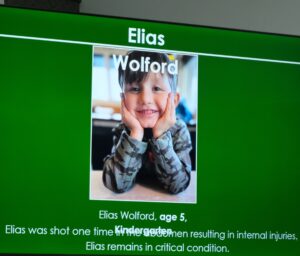by Yucheng Tang
posted Dec. 19
The Dec. 4 Palermo school shooting that severely injured two kindergarteners appears to fit more under “domestic terrorism” than it would under the hate crime category, says Butte County District Attorney Mike Ramsey.
Ramsey also indicated, in a recent telephone interview, that he believes the violence was related to the suspect’s mental health problems.

Meanwhile, in a social media post last week, a woman who identifies herself as Debbie Wolford, the grandmother of victim Elias Wolford, said Elias hadn’t had movement of his legs since being hospitalized. In another update this week, a post indicates that Elias had undergone emergency surgery that went well.
The two victims, Elias and Roman Mendez, both still hospitalized, had a short visit with each other, said the Butte County Sheriff’s Office in a Dec. 13 statement.
In the shooting at Feather River Adventist School south of Oroville, the gunman killed himself after injuring the two children, authorities said.
Ramsey suggested the suspect’s actions wouldn’t constitute a hate crime targeting a “protected class,” pointing out that the suspect was himself at one time affiliated with Seventh-day Adventists. According to the Dec. 5 press briefing, the suspect, 56-year-old Glenn Litton, went to a Seventh-day Adventist school in Paradise when he was a young man “many years ago.”

(The State of California defines a hate crime as a crime against a person that is driven by the victim’s disability, gender, nationality, race or ethnicity, religion, or sexual orientation.)
In the opinion of DA Ramsey, the intent of the deceased suspect was to “spread terror in the community that their children were going to be killed.”
Ramsey commented on the suspect’s history of contact with law enforcement. “What we had is in 2015, the federal probation office noted that he had severe mental health issues going back to age 16 and going forward. That was also noted in the probation report in 2002,” he said.
No specific mental health diagnosis was identified in those reports.
Litton was arrested for a number of identity thefts and credit card frauds in Butte County in 2002, and then convicted and sentenced to state prison for a term of eight years and four months in 2003, Ramsey said.
“Because of credit that he got on his prison term, determined by the prison, he got out in 2006,” Ramsey explained. “We have not had any contact other than this afterwards.”
The statement that investigators believe helps explain his motivation to fire at the Palermo school was a typewritten note found on his body, according to Butte County Sheriff Kory Honea. The note said in part, “Countermeasures involving child executions has now been imposed at the Seventh Day Adventist school in California, United States … in necessitated response to Americas involvement with Genocide and Oppression of Palestinians along with attacks towards Yemen.”
During the Dec. 10 Board of Supervisors meeting, Honea furthur discussed the gunman’s possible motivation and the community’s “going forward.”
Investigators have found more correspondence that was mailed to various people by Litton. Honea said: “It was a longer version of his explanation … because of his view that Seventh-day Adventists were somehow complicit in genocide with Palestinians or the U.S. attacks in Yemen.”
Investigators also suspect there was an alternative or additional target. “Mr. Litton also researched the Seventh-day Adventist school in Red Bluff,” Honea noted.
“The picture that’s developed for me is he was a rather sharp, he certainly (is an) intelligent guy, had the ability to plan, be meticulous (about) those kinds of things,” Honea said, “but appears to have developed a rather significant hatred for the federal government and pulled various aspects of reality into his paradigm, which caused him to formulate these views.”
Honea said: “… there is no 100% guarantee of safety anywhere in our society, which is why it’s so important that we remain vigilant, that we spend time learning as much as we can from this subject’s activities. And try to find a way to mitigate those risks.
“And the challenging part of this,” Honea continued, “is that he targeted a group of people who are inherently open and inviting and want to bring people in. And he played on that vulnerability. So the challenge going forward then is to find a way to still provide that open, welcoming kind of environment, but ensure the safety and security of the students there.”
Yucheng Tang is a California Local News Fellow reporting for ChicoSol.

The genocide occurring in Gaza is now affecting the young and innocent of our enabling nation.